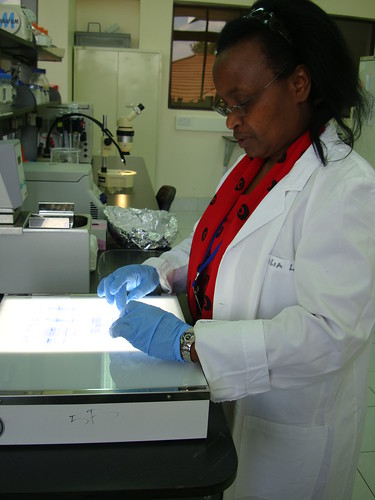ILRI technician Cecilia Muriuki prepares protein samples in one of ILRI’s animal health laboratories (photo credit: ILRI/Susan MacMillan).
Global life science tools company Illumina (NASDAQ: ILMN) has announced the recipients of grants from its ‘Agricultural Greater Good Initiative’. One of these is the BecA-ILRI Hub, a state-of-the-art biosciences laboratory and facility platform located in Nairobi, Kenya.
The Biosciences eastern and central Africa-International Livestock Research Institute Hub (BecA-ILRI Hub), says the news release from Illumina, is ‘pioneering applications of Illumina technologies to increase crop yields and reduce poverty and hunger. . . .
BecA-ILRI Hub will use the grant to expand its study of genetic resistance to cassava brown streak disease and cassava mosaic disease, both of which have infected large percentages of crops across East Africa where cassava is a major source of nutrition.
‘”There is nothing more foundationally important to health than food, and Illumina is excited to be involved with organizations working at the forefront of food security,” said Jay Flatley, President and CEO of Illumina. “Collaboration will enable the power of genomics to impact more people and on a global scale.”. . .
“Collaborations like these between Illumina and the BecA-ILRI Hub are very welcome as they are key contributors towards strengthening agricultural research and capacity development in Africa,” said Dr. Appolinaire Djikeng, interim Director of the BecA-ILRI Hub. “If we are to bring Africa out from the shadow of poverty and food insecurity, then African scientists must have the tools to conduct research at the same level as other scientists around the world.”
‘In 2012, Illumina broadened the scope of the Agricultural Greater Good Initiative through engagement with the Bill & Melinda Gates Foundation and Dow AgroSciences, as well as with the Feed the Future Initiative of the United States Agency for International Development (USAID).
‘”We’re excited about the opportunity to connect advances in sequencing technologies with the needs of millions of families farming small plots of land in sub-Saharan Africa and South Asia,” said Katherine Kahn, Senior Program Officer at the Bill & Melinda Gates Foundation. “Increasing the productivity and resilience of staple crops including cassava and legumes is key to helping small farmers lift themselves out of poverty.”. . .’
Read the whole news release at Illumina: Illumina announces recipients of Agricultural Great Good Initiative grants: Expanded program focuses on improving food security and furthering agricultural sustainability, 15 Jan 2013.
About Illumina
Illumina is a leading developer, manufacturer, and marketer of life science tools and integrated systems for the analysis of genetic variation and function. It provides innovative sequencing and array-based solutions for genotyping, copy number variation analysis, methylation studies, gene expression profiling, and low-multiplex analysis of DNA, RNA, and protein. It also provides tools and services that are fueling advances in consumer genomics and diagnostics. Illumina technology and products accelerate genetic analysis research and its application, paving the way for molecular medicine and ultimately transforming healthcare. Illumina’s Agricultural Greater Good Initiative, launched in 2011, helps to spur critically needed research that will increase the sustainability, productivity and nutritional density of agriculturally important crop and livestock species. Grant recipients receive donations of Illumina reagents to support their projects.
About the BecA-ILRI Hub
The Biosciences eastern and central Africa-International Livestock Research Institute (BecA-ILRI) Hub is a world-class agricultural research and biosciences facility located at and managed by ILRI in Nairobi, Kenya. It provides support to African and international scientists conducting research on African agricultural challenges and acts as a focal point for learning, interaction and strategic research — enabling collaborations in the scientific community to benefit African farmers and markets within the region. The Hub was established as part of an African Union/New Partnership for Africa’s Development (NEPAD) African Biosciences Initiative, which employs modern biotechnology to improve agriculture, livelihoods and food security in eastern and central Africa. ILRI is a member of the CGIAR Consortium. CGIAR is a global agriculture research partnership for a food-secure future. Its science is carried out by the 15 research centres that are members of the CGIAR Consortium in collaboration with hundreds of partner organizations.

